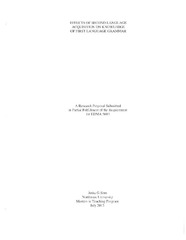Effects of Second Language Acquisition on Knowledge of First Language Grammar
Abstract
In the study of cross-lingual interaction, linguistic research has mainly focused on three areas: LI transfer to L2, subtractive bilingualism, and additive bilingualism. Of these three areas, the latter is the least studied. There are many theories involving additive bilingualism, though little research to back them up. One of the more prominent of these theories is called the “Cummings Interdependence Hypothesis,” which suggests that L2 acquisition and growth can actually improve LI skills. This research study was designed to explore Cummings Interdependence Hypothesis by focusing on the following question: Does the acquisition of a second language improve knowledge of LI grammar? This study employed a quantitative ex-post-facto study model. A two sectioned survey, with a total of 22 questions (16 multiple choice and 6 fill in the blank) was administered to 94 voluntary high school students. Responses were anonymous and divided into control and experimental groups based on whether or not students had experience with second language acquisition. Total correct answers from both groups were compared, and the results were clear: students with second language acquisition scored significantly higher than students in the experimental group on questions designed to measure understanding of LI grammar. The average score of the students with ASL experience was 31.4%, higher than their non ASL experienced peers. The difference between groups was outside the range of one standard deviation and was therefore statistically significant. In conclusion, this study tentatively suggests that ASL leads to improved ability in LI grammatical skills.
Original item type
PDF
Original extent
iv, 34 pages
Subject
Copyright
This original work is protected by copyright. Copyright is retained by the author(s). Works may be viewed, downloaded, or printed, but not reproduced or distributed without author(s) permission.


 Maintained by the Northwest University Library
Maintained by the Northwest University Library